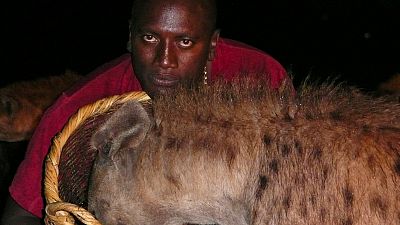Ethiopia
Feeding a hyena sounds absurd but it is happening in Harar, a walled city in Ethiopia. The ancient town is 525 kilometres away from the capital Addis Ababa.
Harar was a regional trading hub and a major Islamic city in East Africa. But when it was defeated by Christian Ethiopians in a war that saw many Islamic cities captured, the commander at that time, ordered the construction of a wall to protect the town.
According to local folklore, the feeding of hyenas in Harar originated during a 19th century famine when the hyenas began to attack livestock and humans in the walled city. Inhabitants then offered the hyenas food to discourage them from eating their livestock.
“If we stop feeding them,we run the risk of they attacking our goats and cattle,and so we must continue to do this every day,“said Habus Yossuf, Hyena man. ### Hyena Men
The practise is believed to have been commercialized in the 1960s. Young men in the town found a new way to make money. Hyena men, as they are called, gave each hyena a name to respond to their calls. They have a peculiar way of calling the hyena. They put pieces of raw meat on sticks and give them to the Hyenas.
“Our father fed them, my older brother helped him with leftover meat. I was also trained by my older brother to feed them,” said Beniyam Ashenafi, Hyena man.
Most times these are leftover meat. The daring but fun part of it all is feeding the hyena mouth to mouth. The job of the hyena whisperers is raking in revenue because the practise has caught up with tourists both domestic and foreign. The Ethiopian government announced plans to pay them salaries to keep the tradition.
Spiritual Connection
“The local Muslim community believes that hyenas have spiritual powers too so during an annual festival they feed them with porridge and depending on the quantity the hyenas eat, they can tell if it will be a good or a bad year,” said Remedan Ahmed, farmer.
Harar was included in the UNESCO World Heritage List in 2006 in recognition of its cultural heritage. It is considered ‘the fourth holy city’ of Islam with 102 shrines and 82 mosques, three of which date back to the 10th century.














01:51
China expands visa-free travel to 74 countries, Africa left out
01:13
China and Ethiopia reaffirm alliance at meeting on sidelies of BRICS summit
02:19
Morocco sees surge in Chinese tourists
01:51
In this Moroccan crocodile park, children learn about the environment
02:09
In a bid to aid its economy, Lebanon hopes to return to golden age of tourism
01:07
China's visa-free policy for five Latin American countries takes effect